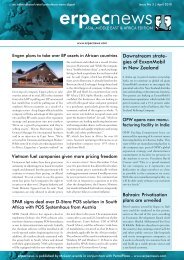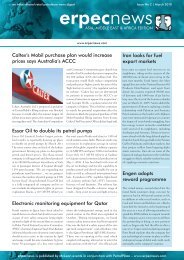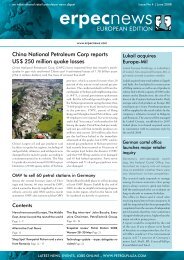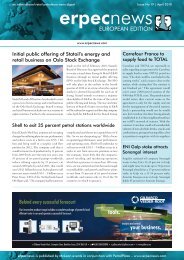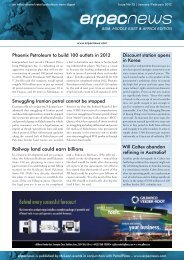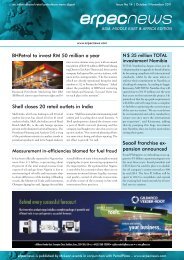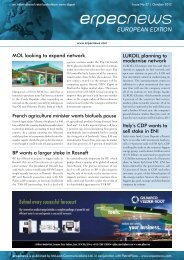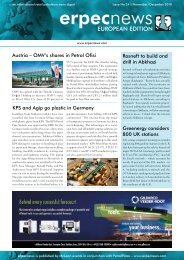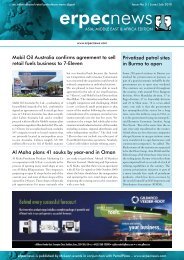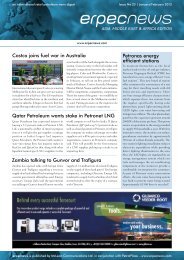Create successful ePaper yourself
Turn your PDF publications into a flip-book with our unique Google optimized e-Paper software.
NewS – euroPe<br />
eni agip gets approval<br />
to buy exxonMobil network<br />
in austria<br />
Italian oil giant Eni, which is present in<br />
Austria through Agip, has received formal<br />
approval by the European Commission to<br />
buy ExxonMobil’s downstream business in<br />
the country. The deal includes a network<br />
of 135 Esso retail service stations as well<br />
as ExxonMobil’s industrial and wholesale<br />
business with 36 additional Esso branded<br />
retail service stations owned by resellers.<br />
London will see ‘green’<br />
black cabs in time for<br />
2012 olympics<br />
Zero-emission black cabs will be on the<br />
roads in time to show London’s green credentials<br />
to the world, as people converge on<br />
the capital for the 2012 Olympics. Clean,<br />
near-silent electric motors will be used in<br />
the vehicles, which will have “fuel cell” batteries<br />
charged by converting hydrogen into<br />
electricity. The cabs will emit only water<br />
vapour. The taxis, able to travel at up to<br />
80 mph, will be capable of running for a day<br />
without refuelling. Six specialist hydrogen<br />
filling stations will be constructed around<br />
the capital. London Taxis International,<br />
Intelligent Energy and other partners are<br />
working together to produce the new cabs.<br />
Deputy Mayor Kit Malthouse said: “The<br />
black cab is a London icon but it is also a<br />
source of pollution. This prototype, which<br />
emits only water from its tailpipe, is a glimpse<br />
of how hydrogen technology could soon<br />
play a vital role in cleaning up air quality.”<br />
SoCar in partnership<br />
with aP Petroleum<br />
The State Oil Company of Azerbaijan<br />
( SOCAR) has drawn a foreign operator to<br />
develop its own network of filling stations<br />
in the country. SOCAR informed that the<br />
network is run by its sub-company SOCAR<br />
Petroleum, operating in alliance with foreign<br />
partner AP Petroleum. Earlier this<br />
year, SOCAR opened its first three filling<br />
stations and intends to bring the network<br />
up to 10 petrol stations by this September<br />
with its target being to double the number<br />
of stations by mid-2011.<br />
e.u. announces tighter controls on biofuels<br />
The European Commission have announced<br />
a quality-certification process for biofuels<br />
and ethanol and clarifying limits on fuels<br />
from sensitive areas like forests and partly<br />
drained peat lands. Ensuring that biofuels are<br />
a credible source of low-carbon energy that<br />
deliver greenhouse gas savings compared with<br />
fossil fuels is a key component of European<br />
Union efforts to set standards worldwide for<br />
lowering emissions over the next 10 years.<br />
Europe plans to rely on biofuels to “do most<br />
of the work” reducing emissions from cars<br />
and trucks, the commission, the executive<br />
arm of the European Union, said in a statement<br />
last month. Reducing transportation<br />
emissions was “particularly hard to achieve<br />
and reliance on imported oil is particularly<br />
high”, it said. The 27 member countries of<br />
the European Union agreed two years ago<br />
to generate 10 percent of their transportation<br />
fuel from renewable sources by 2020. A<br />
large proportion is supposed to come from<br />
biofuels. The remainder would come from<br />
other sources, like electric vehicles.<br />
But the green credentials of the policy were<br />
badly dented as energy experts issued a stream<br />
of reports suggesting that many of the biofuels<br />
on the market were causing more emissions<br />
than conventional fuels if the full emissions<br />
costs of producing the fuels were taken into<br />
account. A sudden spike in food prices at<br />
about the same time served to highlight the<br />
potentially negative effects biofuels, which<br />
some experts said were displacing food crops<br />
and making corn, wheat and soy harder to<br />
obtain for human nutritional needs. Some<br />
companies that import palm oil into Europe<br />
have already made commitments to follow<br />
sustainability guidelines under development<br />
by environmental groups and by industry<br />
groups. Mr. Oettinger’s (E.U. energy commissioner)<br />
endorsement represents a way for the<br />
commission to certify that those guidelines<br />
meet E.U. standards, and commission officials<br />
said he planned to call on companies to apply<br />
for the quality stamp before year-end. The<br />
announcement is Mr. Oettinger’s first major<br />
policy statement on renewable energy. Commission<br />
officials said the statement showed his<br />
commitment to restoring the green credentials<br />
of the fuels.<br />
Mr. Oettinger also attempted to clarify that<br />
companies must not interpret existing E.U.<br />
rules to cut down forests or sow crops on<br />
partly drained peat lands for biofuels, commission<br />
officials said. Even partly drained<br />
peat land still contains significant amounts<br />
of stored carbon, which can escape as carbon<br />
dioxide gas once the land is cultivated and<br />
contribute to climate change. But the tighter<br />
4 LateSt NewS, eveNtS, JobS oNLINe – www.PetroLPLaza.CoM<br />
rules on peat lands could anger countries like<br />
Indonesia and Malaysia, which are the major<br />
suppliers of palm oil used to make biodiesel<br />
for European motorists. Officials said trade<br />
experts at the commission had established<br />
that the measures would be compatible with<br />
international trade rules, partly because they<br />
would apply equally to biofuels producers<br />
growing crops inside and outside the bloc.<br />
Mr. Oettinger’s quality stamp, “Recognized<br />
by the European Union”, also could prove<br />
controversial. He still must reach a decision<br />
on how to calculate the emissions created<br />
when food crops have been displaced by<br />
fuel crops, and when areas containing high<br />
stores of carbon like grasslands, peat lands<br />
or forests are chopped down to produce the<br />
food crops elsewhere.<br />
E.U. officials said Mr. Oettinger’s stamp<br />
could include criteria on Indirect Land Use<br />
Change, in the jargon of emissions experts,<br />
once he decides on the scale of its effects at<br />
the end of this year. But experts warned that<br />
the stamp risked ending up being criticized<br />
for legitimizing unsustainable practices. A<br />
“labeling system which is not dealing with<br />
the indirect effects will not be regarded as<br />
a guarantee for sustainability”, said Jan Ros,<br />
Project Leader for bioenergy at the Netherlands<br />
Environmental Assessment Agency, a<br />
Dutch national institute for environmental<br />
research and planning. “The real challenge<br />
is to find biofuels that do not create these<br />
indirect effects like fuels from crops grown<br />
on degraded lands or fuels generated from<br />
waste products”, Mr. Ros said. E.U. officials<br />
said the stamp would be added to the labels<br />
used by sustainability programs managed<br />
by governments, civil society organizations<br />
or industry bodies that meet E.U. criteria.<br />
Although the certification would last for five<br />
years, it would also rely on annual checks<br />
done by outside auditors, but those audits<br />
would be paid for by fuel producers.<br />
Companies would also be free to decide how<br />
to display the stamp, and that could limit its<br />
use to farmers and processors. But commission<br />
officials said they were hopeful that fuel companies<br />
would also begin voluntarily displaying the<br />
label at fuel pumps, so that motorists seeking<br />
greener options would feel assured that their<br />
purchase was making a contribution to the<br />
environment. Commission officials also said<br />
they wanted to use a light touch in regulating<br />
how biofuels were labeled, so that companies<br />
achieving higher-than-average reductions in<br />
greenhouse gases compared with fossil fuels,<br />
or companies applying even more ambitious<br />
sustainability criteria, could devise their own<br />
certification programs.



